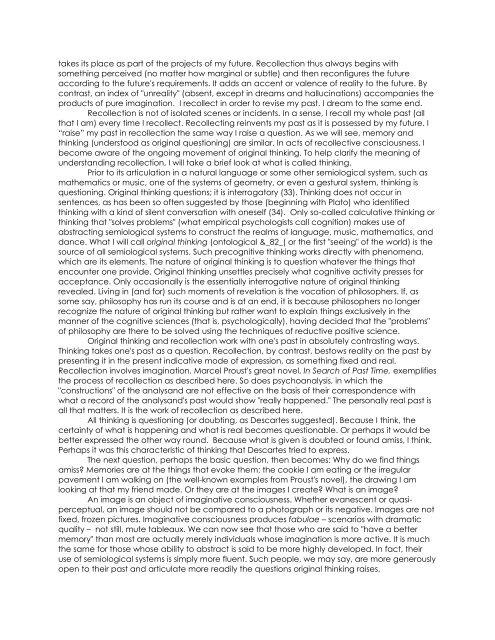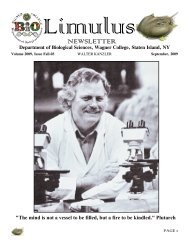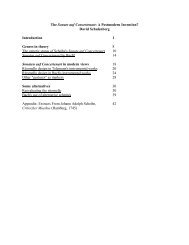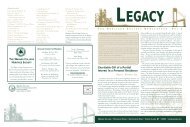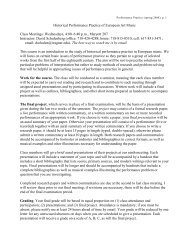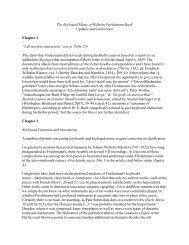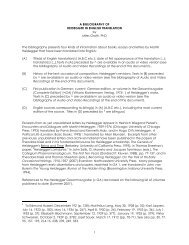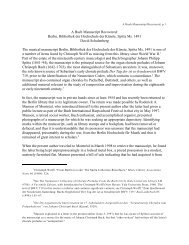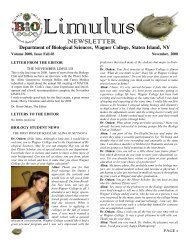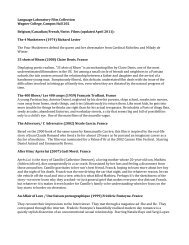SEVEN PAPERS ON EXISTENTIAL ANALYSIS ... - Wagner College
SEVEN PAPERS ON EXISTENTIAL ANALYSIS ... - Wagner College
SEVEN PAPERS ON EXISTENTIAL ANALYSIS ... - Wagner College
You also want an ePaper? Increase the reach of your titles
YUMPU automatically turns print PDFs into web optimized ePapers that Google loves.
takes its place as part of the projects of my future. Recollection thus always begins with<br />
something perceived (no matter how marginal or subtle) and then reconfigures the future<br />
according to the future's requirements. It adds an accent or valence of reality to the future. By<br />
contrast, an index of "unreality" (absent, except in dreams and hallucinations) accompanies the<br />
products of pure imagination. I recollect in order to revise my past. I dream to the same end.<br />
Recollection is not of isolated scenes or incidents. In a sense, I recall my whole past (all<br />
that I am) every time I recollect. Recollecting reinvents my past as it is possessed by my future. I<br />
“raise” my past in recollection the same way I raise a question. As we will see, memory and<br />
thinking (understood as original questioning) are similar. In acts of recollective consciousness, I<br />
become aware of the ongoing movement of original thinking. To help clarify the meaning of<br />
understanding recollection, I will take a brief look at what is called thinking.<br />
Prior to its articulation in a natural language or some other semiological system, such as<br />
mathematics or music, one of the systems of geometry, or even a gestural system, thinking is<br />
questioning. Original thinking questions; it is interrogatory (33). Thinking does not occur in<br />
sentences, as has been so often suggested by those (beginning with Plato) who identified<br />
thinking with a kind of silent conversation with oneself (34). Only so-called calculative thinking or<br />
thinking that "solves problems" (what empirical psychologists call cognition) makes use of<br />
abstracting semiological systems to construct the realms of language, music, mathematics, and<br />
dance. What I will call original thinking (ontological &_82_( or the first "seeing" of the world) is the<br />
source of all semiological systems. Such precognitive thinking works directly with phenomena,<br />
which are its elements. The nature of original thinking is to question whatever the things that<br />
encounter one provide. Original thinking unsettles precisely what cognitive activity presses for<br />
acceptance. Only occasionally is the essentially interrogative nature of original thinking<br />
revealed. Living in (and for) such moments of revelation is the vocation of philosophers. If, as<br />
some say, philosophy has run its course and is at an end, it is because philosophers no longer<br />
recognize the nature of original thinking but rather want to explain things exclusively in the<br />
manner of the cognitive sciences (that is, psychologically), having decided that the "problems"<br />
of philosophy are there to be solved using the techniques of reductive positive science.<br />
Original thinking and recollection work with one's past in absolutely contrasting ways.<br />
Thinking takes one's past as a question. Recollection, by contrast, bestows reality on the past by<br />
presenting it in the present indicative mode of expression, as something fixed and real.<br />
Recollection involves imagination. Marcel Proust's great novel, In Search of Past Time, exemplifies<br />
the process of recollection as described here. So does psychoanalysis, in which the<br />
"constructions" of the analysand are not effective on the basis of their correspondence with<br />
what a record of the analysand's past would show "really happened." The personally real past is<br />
all that matters. It is the work of recollection as described here.<br />
All thinking is questioning (or doubting, as Descartes suggested). Because I think, the<br />
certainty of what is happening and what is real becomes questionable. Or perhaps it would be<br />
better expressed the other way round. Because what is given is doubted or found amiss, I think.<br />
Perhaps it was this characteristic of thinking that Descartes tried to express.<br />
The next question, perhaps the basic question, then becomes: Why do we find things<br />
amiss? Memories are at the things that evoke them: the cookie I am eating or the irregular<br />
pavement I am walking on (the well-known examples from Proust's novel), the drawing I am<br />
looking at that my friend made. Or they are at the images I create? What is an image?<br />
An image is an object of imaginative consciousness. Whether evanescent or quasiperceptual,<br />
an image should not be compared to a photograph or its negative. Images are not<br />
fixed, frozen pictures. Imaginative consciousness produces fabulae – scenarios with dramatic<br />
quality – not still, mute tableaux. We can now see that those who are said to "have a better<br />
memory" than most are actually merely individuals whose imagination is more active. It is much<br />
the same for those whose ability to abstract is said to be more highly developed. In fact, their<br />
use of semiological systems is simply more fluent. Such people, we may say, are more generously<br />
open to their past and articulate more readily the questions original thinking raises.


